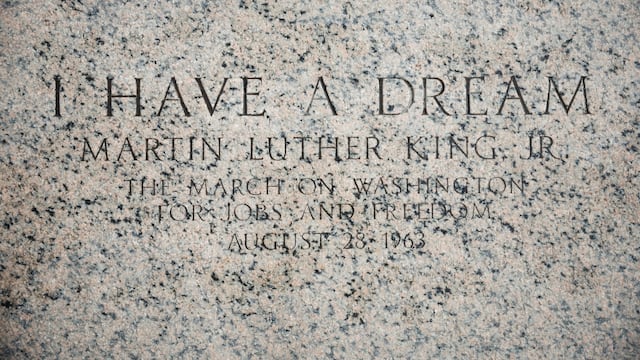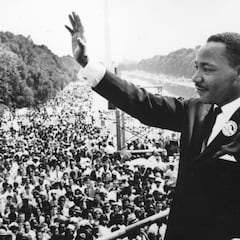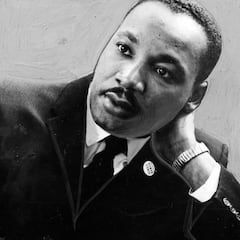Martin Luther King gave over 2,500 public speeches during his lifetime – many of them were delivered without a manuscript and with few notes.

Martin Luther King Jr Day: MLK famous quotes and speeches “I have a dream”

Despite Trump’s attempt to cancel Martin Luther King Day, today the United States celebrates the Civil Rights activist and his work and sacrifice to help obtain freedom and liberty for African Americans.
Dr. Martin Luther King Jr. gave over 2,500 public speeches during his lifetime – many of them were improvised, delivered without a manuscript and with maybe just a few notes. Dr. King’s most famous speech, known as, “I have a dream” was given in front of an audience of 250,000 on a long, hot Wednesday, 28 August 1963 at the March on Washington for Freedom and Jobs. King was one of a number of speakers who addressed the masses on the steps of the Lincoln Memorial in Washington DC that day – others included civil rights leaders such as Roy Wilkins, A. Philip Randolph, March organizer Whitney Young and UAW president Walter Reuther although none has the power and resonance of Doctor King’s, which many claim to be the greatest public speech ever made.
“I have a dream”
Perhaps King’s most well-known, his amazing speech on the steps of the Lincoln Memorial has left a proud mark on American political history. Lasting almost 18 and a half minutes, King veered away from his manuscript and began to improvise, incorporating lines from speeches and sermons he had given in previous years.
The reference to a dream date back to September 1960 when he described America as “a dream yet unfulfilled”. He also used the “I have a dream” refrain during a speech in North Carolina in November 1962.
Towards the end of his speech at the Lincoln Memorial, according to King’s adviser Clarence Jones, gospel singer Mahalia Jackson, who was standing in the crowd about 50 feet away from the podium shouted out: “Tell them about the dream, Martin! Tell them about the dream!” That was the moment when Dr. King pushed his notes to one side and embarked on a stirring, improvised masterpiece.
“I say to you today, my friends, so even though we face the difficulties of today and tomorrow, I still have a dream. It is a dream deeply rooted in the American dream. I have a dream that one day this nation will rise up and live out the true meaning of its creed: ‘We hold these truths to be self-evident: that all men are created equal.’ I have a dream that one day on the red hills of Georgia the sons of former slaves and the sons of former slave owners will be able to sit down together at the table of brotherhood. I have a dream that one day even the state of Mississippi, a state sweltering with the heat of injustice, sweltering with the heat of oppression, will be transformed into an oasis of freedom and justice. I have a dream that my four little children will one day live in a nation where they will not be judged by the color of their skin but by the content of their character. I have a dream today. I have a dream that one day, down in Alabama, with its vicious racists, with its governor having his lips dripping with the words of interposition and nullification; one day right there in Alabama, little black boys and black girls will be able to join hands with little white boys and white girls as sisters and brothers. I have a dream today...”
Apart from being powerfully inspirational to all of those who witnessed it, King’s electrifying speech could not have done more to promote the civil rights cause. A few months later in July 1964, the Civil Rights Act of 1964 was signed into law.
Nonviolence
Dr. King never set out to become a public speaker or a leader of a movement but it became clear that he had an innate gift for both – with nonviolence always at the heart of his message. He gave his first sermon in front of about 5,000 people at Holt Street Baptist Church in Montgomery, Alabama on 5 December 1955. Entitled “Facing the Challenge of the New Age”, it took the 26-year-old King around 20 minutes to write although in his autobiography he admits that he spent around five of those minutes having a panic attack. Halfway through, he included a line from the Book of Amos: “Love has no meaning. And we are determined here in Montgomery to work and fight until justice runs down like water (Yes!) and righteousness like a mighty stream”.
Dr. King’s final speech in April 1968
King gave his last speech “I have been to the mountaintop” at Mason Temple in Memphis on 3 April 1968. Towards the end of his 43-minute address, he said, “Like anybody, I would like to live a long life. Longevity has its place. But I’m not concerned about that now. I just want to do God’s will. And He’s allowed me to go up to the mountain. And I’ve looked over. And I’ve seen the Promised Land. I may not get there with you. But I want you to know tonight, that we, as a people, will get to the promised land!” The following day at 6 pm, he was assassinated at Lorraine Motel. He was 39 years old.
Below are a few examples of Dr. King’s writings and speeches which are available online at The King Center and through The King Institute Papers Project archives at Stanford University.
“Why should one love his enemy? Because the process of hate for hate brings disaster to all involved. Because hate distort the whole personality. Because love has within it a redemptive power”.
“I do not come here with a message of bitterness, hate or despair. I come with a message of love and a message of hope. Press on and keep pressing. If you can’t fly, run; if you can’t run, walk; if you can’t walk— crawl!”
“The word, integration, is probably one of the best-known words in our language now. It is on the lips of statesmen of all races; it is a big word in our society”.
“Let us continue our triumphant march to the realization of the American dream. Let us march on segregated housing until every ghetto or social and economic depression dissolves, and Negroes and whites live side by side in decent, safe, and sanitary housing. Let us march on segregated schools until every vestige of segregated and inferior education becomes a thing of the past, and Negroes and whites study side-by-side in the socially-healing context of the classroom.
“Let us march on poverty until no American parent has to skip a meal so that their children may eat. March on poverty until no starved man walks the streets of our cities and towns in search of jobs that do not exist. Let us march on poverty until wrinkled stomachs in Mississippi are filled.”
Related stories
Get your game on! Whether you’re into NFL touchdowns, NBA buzzer-beaters, world-class soccer goals, or MLB home runs, our app has it all.
Dive into live coverage, expert insights, breaking news, exclusive videos, and more – plus, stay updated on the latest in current affairs and entertainment. Download now for all-access coverage, right at your fingertips – anytime, anywhere.


Complete your personal details to comment